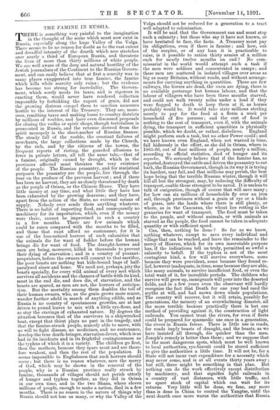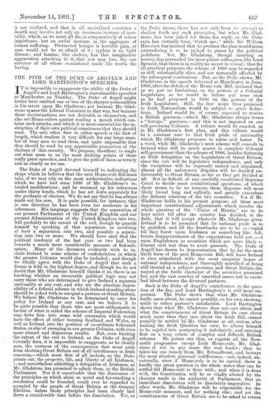THE FAMINE IN RUSSIA. T HERE is something very painful to
the imagination in the thought of the scene which must now exist in Russia, especially along the huge Valley of the Volga. There seems to be no reason for doubt as to the vast extent and dreadful intensity of the dearth which now stretches over nearly a third of European Russia, and threatens the lives of more than thirty millions of white people. We are well aware of the deep and natural hostility of the Jewish journalists of the Continent to the Russian Govern- ment, and can easily believe that at first a scarcity was in many places exaggerated into true famine, the famine which kills while scarcity only ruins ; but the evidence has become too strong for incredulity. The Govern- ment, which sorely needs its taxes, and is rigorous in exacting them, would never have rendered collection impossible by forbidding the export of grain, did not the growing distress compel them to sanction measures hostile to the interest of the Treasury. They are, more- over, remitting taxes and making loans to country districts by millions of roubles, and have even discussed proposals for closing the vodka or spirit shops, though teetotalism is persecuted in Russia, and the revenue derived from the spirit monopoly is the sheet-anchor of Russian finance. The steady fall of the rouble, the constant failures of merchants, the large collections made by the Church, by the rich, and by the citizens of the towns, the frequent reports of rioting, the guarded allusions to fever in private letters, all tell the same tale,—that of a famine, originally caused by drought, which in the provinces affected must threaten the very existence of the people. The Russian peasantry, and for statistical purposes the peasantry are the people, live through the year on the produce of the previous harvest ; and if there has been no harvest, they are as closely threatened by death as the people of Orissa, or the Chinese Shans. They have little money at any time, and what little they have has been exhausted by the growing dearness; and they have, apart from the action of the State, no external means of supply. Nobody ever sends them anything whatever. There is no habit of importing food, and consequently no machinery for its importation, which, even if the money were there, cannot be improvised in such a country in a few months. There are few animals which could be eaten compared with the mouths to be filled, and those that exist afford no sustenance, for it is one of the less-noticed horrors of such calamities that the animals die for want of fodder before the human beings die for want of food. The draught-horses and oxen are being, moreover, killed in thousands to prevent their dying of starvation ; and in a country of peasant- proprietors, before the owners will consent to that sacrifice, the poor beasts are nothing but hide-bound bags of half- paralysed sinew and bone. We need not, perhaps, pity the beasts specially, for every wild animal of every sort which survives all accidents and the chances of battle with its kind, must in the end die, and does die, of starvation, and the beasts are spared, as men are not, the horrors of anticipa- tion. But the mortality among them doubles the toil of their human owners, who, as the grain grows more scarce, wander further afield in search of anything edible, and as Russia is no country of spontaneous growths, are at last driven to pound leaves to mix with a little rye-flour, and so stay the cravings of exhausted nature. By degrees the situation becomes that of the survivors in a shipwrecked boat, except that thirst plays no part in the tragedy, and that the famine-struck people, scarcely able to move, with no will to fight disease, no medicines, and no sustenance, develop the true death-bringer, starvation-fever, which is as bad in its incidents and in its frightful contagiousness as the typhus of which it is a variety. The children go first, then the mothers, because they spare most and are there- fore weakest, and then the rest of the population. It seems impossible to Englishmen that such horrors should occur ; but there is no reason whatever, save the mercy of God, which may be shown in the removal of the people, why in a Russian province really struck by famine, thousands of villages should not perish utterly of hunger and typhus together, as they did in Orissa in our own time, and in the two Shans, where eleven millions of people, enough to make a nation, died in a few months. There is no reason in the nature of things why Russia should not lose as many, or why the Valley of the Volga should not be reduced for a generation to a tract well adapted to colonisation.
It will be said that the Government can and must stop such a calamity ; but those who say it have not known, or have hesitated to face, the facts. A Treasury must pay its obligations, even if there is famine ; and how, out of the surplus, or of any loan it is practicable to raise, is it possible to ration thirty armies of a million each for nearly twelve months on end ? No com- missariat in the world would attempt such a task if the men were soldiers and concentrated in camps ; and these men are scattered in isolated villages over areas as big as many Britains, without roads, and without arrange- ments for carrying anything in quantities. There are few railways, the horses are dead, the oxen are dying, there is no available porterage but human labour, and that the labour of villagers who have been three months starved, and could not walk twenty miles under a load if they were flogged to death to keep them at it, as horses probably would be. It would take sixty millions sterling merely to pay for the food at a florin a week per household of five persons ; and the cost of food is nothing to the cost of transport, even if, with the animals dying, the transport in sufficient quantities is physically possible, which we doubt, or rather, disbelieve. England might perform such a task, but no other Power could ; and we have known even England, when not warned in time, fail hideously in the effort, as she did in Orissa, where in 1865-66, out of four millions of people, nearly a million, according to official statistics, died of hunger and its seguebe. We seriously believe that if the famine has, as reported,destroyed the cattle and driven the peasantry to eat bark, the Russian Government, though in its way it is trying its hardest, may fail, and that millions may perish, the best hope being that the terrible Russian winter, though it will kill all but the strongest, may, by reducing the difficulty of transport, enable those strongest to be saved. It is useless to talk of emigration, though of course that will save many ; for how can six millions of households fly over an iron soil, through provinces without a grain of rye or a blade of grass, into the lands where there is still plenty, or where, as in the Caucasus, the wheat lies rotting in the granaries for want of transport. The food must be taken to the people, and without animals, or with animals as starved as the people, the food cannot be taken in adequate quantity or with sufficient speed. Can, then, nothing be done ? So far as we know, nothing whatever, except to save every individual and village that can be reached, and leave the remainder to the mercy of Heaven, which for its own inscrutable purpose has, if the indications tell us truly, permitted so awful a calamity to befall. If the typhus is not of the most contagious kind, a few will survive everywhere, some because they were provident, some because they found re- lief, however inadequate, in time, some because they are able, like many animals, to survive insufficient food, or even the total want of it, for incredible periods. The children who survive will grow up, immigrants will pour into the deserted fields, and in a few years even the observant will hardly recognise the fact that Death for one year had used the scythe at will, and had mown down whole populations. The country will recover, but it will retain, possibly for generations, the memory of an overwhelming disaster, all the more terrible because practically there is but one method of providing against it, the construction of light railroads. You cannot trust the rivers, for even if fleets could be prepared for spasmodic use once in a generation, the rivers in Russia freeze. There is little use in roads, for roads imply beasts of draught, and the beasts, as we have insisted all through, die quicker than the men. Joseph's remedy is better than these ; and we suppose that in the most dangerous spots, which must be well known to local authorities, rye-biscuit could be stored sufficient to give the authorities a little time. It will not be, for a State will not incur vast expenditure for a necessity which may never come, and is at all events thirty years away ; but still, there might be something in that plan. But nothing can do the work effectively except distribution by machinery, and that signifies light railroads in a country of vast distances, with little traffic, and no spare stock of capital which can wait for its returns. Very little will be done, we fear, any more than is done in China to control the Yangtse, until the next dearth once more warns the authorities that Russia is not civilised, and that in all uncivilised countries a dearth may involve not only an enormous increase of mor- tality, which, as we must all die, is comparatively of minor importance, but an awful increase in the aggregate of human suffering. Protracted hunger is horrible pain, or man would not be so afraid of it ; typhus is no light disease ; and famine, like cholera, has this imaginative aggravation attaching to it, that you may live, the one survivor of all whose co-existence made life worth the having.







































 Previous page
Previous page